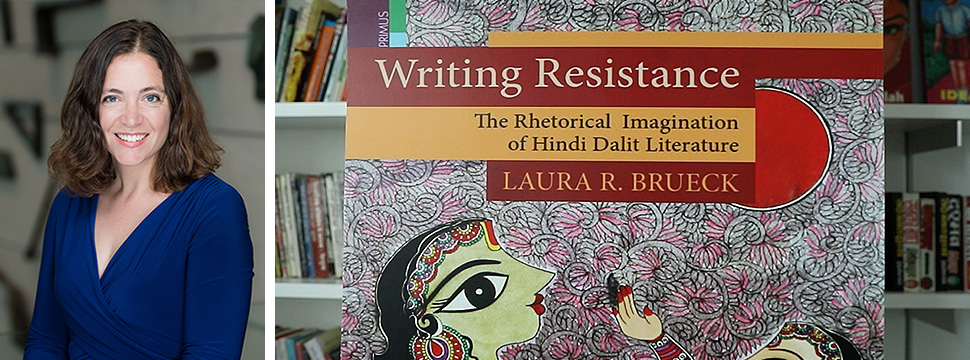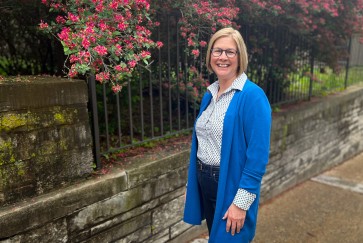-Part of a special feature on literary translation
“Translation is so deeply fundamental to the way cultures encounter each other.”
In an office lined with Hindi pulp fiction novels — her latest translation project — professor Laura Brueck explains that if she has one mission at Northwestern, it is to amplify the importance of literary translation both within and beyond the academy.
“Translation is also extraordinarily fundamental to multiculturalism and cultural tolerance,” Brueck says. “In a day when our national borders are becoming ever more closed, the stories of human experience can travel across borders. I think translations enable not just the circulation of narrative, but even more importantly, the circulation of compassion and understanding.”
While pursuing a graduate degree in South Asian studies, Brueck studied Hindi, Urdu and Sanskrit. She became especially fascinated with the Dalits, a group of about 200 million people at the bottom of India’s caste system, who face intense discrimination, abuse, and harsh living and working conditions. Doing research in India in 2003, Brueck became involved with a local writers group called the Dalit Lekhak Sangh (Dalit Writers Forum). It was in this group that Brueck met Ajay Navaria, an Indian writer and scholar as well as a powerful voice in the politically charged Dalit literature community.
“Ajay’s work is ideologically dense, and I found that really exciting,” Brueck says. She began translating his work as part of her research.
That same year, Brueck learned about an up-and-coming publishing house called Navayana, started by Indian journalist S. Anand. Brueck arranged to meet with Anand after taking an interest in Navayana’s political bent. The two kept in loose touch — often attending the same conferences and lectures in India — as Brueck finished her Ph.D. and began her scholarly career.
In 2009, Brueck was teaching at the University of Colorado when she received an email from Anand. After reading a magazine profile of Navaria, Anand had reached out to Navaria and asked “Has anyone translated your work?”
“Well, there is this woman in Colorado…,” Navaria responded. Anand knew just who he meant. A month later, Anand, Brueck and Navaria were eating dinner in India, mapping out plans to publish a translated collection of Navaria’s stories.
Over the course of the next two-and-a-half years, Brueck translated Unclaimed Terrain, a collection of seven of Navaria’s short stories that offers a raw and honest look at the underworld of Dalit culture. Now chair of Northwestern’s Department of Asian Languages and Cultures, Laura says her collaboration with Navaria not only changed his life, but signaled a turning point in hers as well.
Because of Laura’s translation, I have been able to travel and speak at universities all over the world, and these trips have expanded my worldview to the benefit of my writing. ”
Author

“Translating these stories was the most intense, challenging, gratifying thing I’ve ever gone through,” she says, “and it really whetted my appetite for translation that could circulate in the world.”
And circulate in the world they did. Brueck recalls waking up one day last year to a flurry of text messages. Navaria was in Australia for a workshop, and participants were using Brueck’s English translations of his stories.
“There were groups of literary scholars translating the stories into Indonesian, Chinese, French, German — it was extraordinary,” Brueck says. “All of this has happened because I translated one small volume of his short stories and because that volume has been able to circulate in the world in a way that the Hindi stories couldn’t. That’s been very exciting for us, and eye-opening in terms of the power of translation.”
Brueck is now carefully sifting through the piles of Hindi pulp novels — largely detective fiction — that line the walls of her Evanston office. While Hindi pulp fiction — regarded as “throwaway reading that people borrow at a train station” — might seem a far cry from politically charged Dalit literature, Brueck says the common threads between the two genres is what appeals to her.
“Both Dalit and pulp literature inhabit the margins of the Indian literary sphere, be they political margins or caste margins,” she says. “I find these works interesting and exciting because this is what the public consumes. These genres are both reflective of, and in some ways prescriptive of, what’s going on in Indian society around caste, gender, sexuality, crime and race.”
Translation on and off-campus
In the fall of 2015, Brueck and history professor Rajeev Kinra founded the Global Humanities Initiative (GHI). Jointly sponsored by Northwestern’s Buffett Institute for Global Studies and the Alice Kaplan Institute for the Humanities, GHI showcases the arts and culture of the non-West, and the ways in which those traditions contribute to a more tolerant and interconnected world. The following year, Brueck and Kinra established the Global Humanities Translation Prize. Recognizing a translation-in-progress of a non-Western literary or scholarly text, the prize is awarded annually in partnership with Northwestern University Press (NU Press), a widely recognized leader in publishing translated work.
In addition to the prize, the Global Humanities Initiative hosts a series of translation salons to amplify the impact of translation beyond Northwestern’s campus. Held in the evenings at a bookstore in Evanston, these open-to-the-public events pair a visiting translator with a Northwestern faculty member who also does literary translation. The two translators discuss how they choose their projects, their process, challenges they face, and how a translation can broaden the reach, and often the acclaim, of the original work.
“Having the public at our translation salons is extremely important and symbolic of the way in which translations move beyond the walls of the ivory tower and into a community of inquiry out in the world,” Brueck says.
When people can access work that has been translated from another language, opportunities for inquiry, learning, and, of course, empathy increase significantly.
“We desperately need people in the world who understand one another much better than they do,” Brueck says. “So much of the conflict we get into emerges out of misunderstanding. And I see literary narrative, and the translation of that literary narrative and the way in which it moves around the world, as starting to cross those gulfs of understanding.”
Laura Brueck is the chair of the Asian Languages and Cultures Department and an associate professor of Indian literature in the Weinberg College of Arts and Sciences. She is co-director of the Global Humanities Initiative, a program co-sponsored by the Buffett Institute for Global Studies and the Alice Kaplan Institute for the Humanities.


